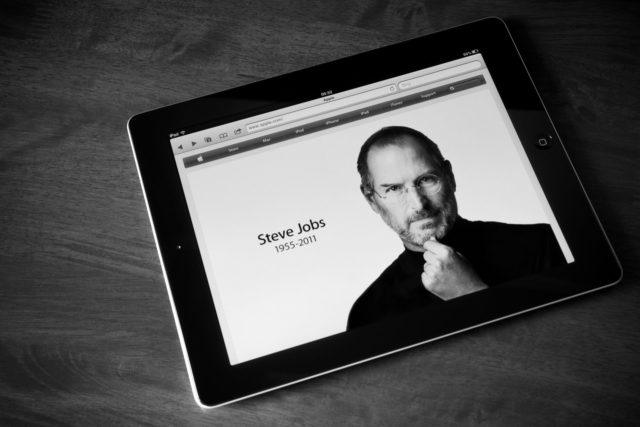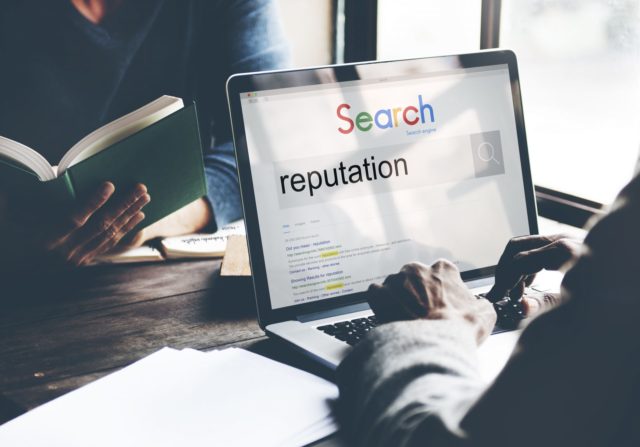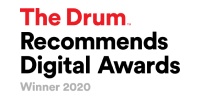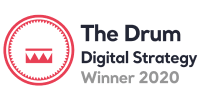Why does anyone care about your personal brand?
If a client or company wants to purchase your business’ service or product, surely they’re not bothered about the person behind it? They just want what you’re selling and to be on their way.
It may surprise a few B2B business owners that this isn’t the case at all. Only a few years ago, a study showed that in fact 48 percent of a brand’s reputation can be attributed to its CEO or its leading voice.
With this statistic in mind, why do we live in a world, which is now driven by digital, experience, and personalisation, where so few businesses take it seriously?
There’s a big opportunity right now for the UK’s SMEs and business owners. We’re just at the beginning of the worst recession for over 100 years, due to the impact of COVID-19, and the need to stand out is greater than ever before.
There’s a quote from Jeff Bezos, the founder of Amazon, that is highly applicable to this discussion: “Your brand is what people say about you when you’re not in the room.” In this post-COVID world, that room is now Google.
With this in mind, personal branding is a door of opportunity just waiting to be opened by business owners. It is time to take it seriously and build a parallel brand that complements and blends with that of the business’.
Why you ask? Because no matter how much digital rules our lives, the old cliché that people buy into people is not going away and will never change.
My colleague Susan Hallam MBE recently wrote a blog on personal branding and how to manage it. Here, I’m aiming to build on that… with the help of a few industry experts and professionals to establish why it’s important and how you can get it right.
First of all, what is a personal brand?
Sticking with my colleague, Susan, just for a moment, she describes personal branding as:
“Personal branding is the process of managing and manipulating the way you present yourself to others. A strong personal brand will give you more credibility, bestow recognition, and prestige, and will give you higher perceived value.”
“It’s a task well worth focusing on, and taking the time to craft a brand that reflects your values and purpose will help you to achieve your professional and personal ambitions.”

Are you happy with what you see when you Google yourself?
Let’s just reflect on that Jeff Bezos quote once more.
“Your brand is what people say about you when you’re not in the room.”
As the business world continues to switch to a digital-first mindset, Google is very quickly becoming that room the Amazon owner talks about.
So, what is Google looking at? It’s looking at what articles you are featuring in, pulling together the topics you’re part of – good and bad – and what you’re posting on your social media channels.
Louise Vaughan, the co-founder and managing director of Definition – a UK business specialising in corporate and personal reputation management – analysed this and said the following: “When you Google yourself, what results come up? And how do they reflect you? Your expertise? Your business? Your personality? Your passion? In short, your personal brand?
“Is the information you are sharing across LinkedIn, Facebook, and other social media sites consistent? How about the content shared by your staff – are they promoting the work that you’re doing on behalf of your clients or just retweeting the meme of the day? These are all different facets of your brand that need to be looked at before you can get a look in.”
Move away from the mainstream. Use the right channels to reach the right audience
Personal branding is not just about posting regularly on Facebook, Twitter, and LinkedIn, though.
All of those social media tools mentioned have huge audiences, yes, but are you talking to the right audiences? Without putting spend behind your posts, the answer is unlikely.
A lot of personal branding also revolves around getting out into the media, providing thought-leadership, and insight into your industry where others are not.
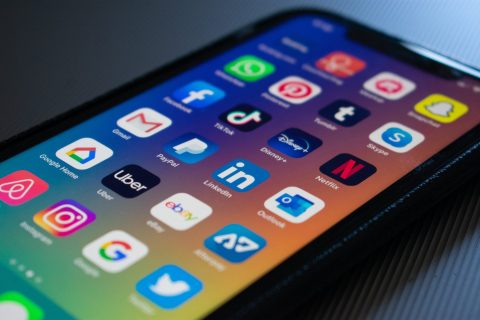
Ashley Freidlien, founder and CEO of Guild, who also previously founded Econsultancy, believes identifying niche groups is the optimum way to build your personal brand with a smaller audience that will engage with what you have to say, delivering a level of intimacy that cannot be replicated on the larger channels.
He said: “On social media platforms like LinkedIn, which is considered a must for B2B networking, it’s becoming increasingly challenging to build a personal brand that cuts through the noise.
“With 62% of LinkedIn users stating that only a fifth of their connections have provided value to their personal career, and 28% stating that it is full of spam. When building a personal brand, it’s important to seek out other places to connect, too.
“Being active in niche communities is a far better way of building a personal brand because it puts you in front of people who already have a shared interest – there is a level of personalisation and intimacy that isn’t replicable on larger social media channels.
“Sharing knowledge and advice, demonstrating expertise, and showing you have a passion for what you do will help you become far more memorable than a LinkedIn profile ever will.”
Finally, Louise Vaughan also had some insight to share on this: “A comprehensive and cohesive social media strategy can really demonstrate the scope of work you’re doing on behalf of clients, as well as highlight that you know what you’re talking about.
“So, react to industry issues, offer an opinion on the latest news, and don’t be shy to share information that you find to be thought-provoking or insightful. Keep it light, but keep it informative.”
Connection is the currency of personal branding – make your audience part of your journey
Regardless of how the business market develops within the digital sphere, people, naturally, want to still feel like they’re part of something.
They want to feel connected to brands. They want to know their opinions are valued.
This topic is one that has been covered in-depth by the senior social community manager at Mediatonic, the developer behind the hit multiplayer game, Fall Guys: Ultimate Knockout, that has blown up this summer.
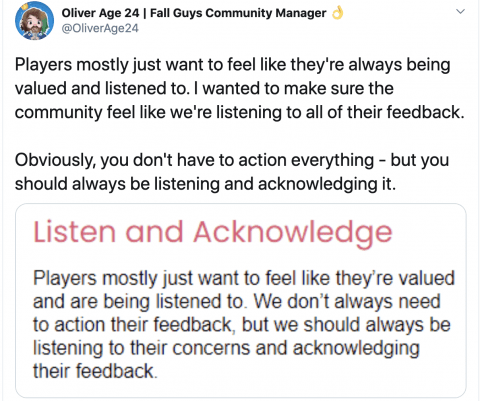
While it cannot be considered B2B, His Twitter thread specifically is talking about the gaming industry, but it is just as applicable to B2B, the way we all build our own personal brands and communicate with audiences for the benefit of the bigger picture: the business brand.
Henry Regan, managing director of business, Carbon Global, supports this evidence: “Look at the Wix adverts, it’s that easy to make a website now and everyone is doing it. A business without a story is not giving your audience the chance to see you and where you came from.
“Companies like Ella’s Kitchen or Elon Musk’s Tesla make sure that there’s a face to that brand to make you feel the human connection and that you’re growing with them.”
The two-sided argument to advocating colleague brand ambassadors to support business goals and messaging
This, arguably, is the most hotly contested debate when it comes to advocating personal brand among a business’ colleagues.
Most reading this article will testify to the fact that they have worked for a company or brand that were strict when it came to staff social media use, or even put bans in place due to lack of trust that something embargoed or ‘under wraps’ would be posted about and spread like wildfire.
Let’s be honest, it’s wholly disheartening for a member of staff to think they are not trusted within their own business.
A company’s staff are at the heart of it, though, and should be encouraged to be part of its brand messaging and story and actively encouraged to work on their own personal brand.
Ashley Freidlien had this to say: “Colleagues and employees should be able to promote their own brand, as doing so is good for morale and recruitment. It can also result in increased awareness of the business if an employee becomes an influencer through successfully marketing themselves.
“The side-hustle economy is booming and just because an employee is developing a personal brand that doesn’t relate to their main employment, it doesn’t mean they are going to leave your organisation. They have more dreams and aspirations outside of the traditional career path – and this should be supported.
“It would be a paranoid employer who didn’t see the benefits of allowing employees to build their own brand – and potentially detrimental to the individual and the business itself.”
Here is the flip-side to this, though. There is a cautious element to consider, however, as outlined by Henry Regan: “Colleagues promoting themselves, and therefore the brand, is great exposure as long as it’s in line with the brand’s core values.
“However, there is obviously also a danger to this. If a colleague goes off-piste and causes offence either by some poorly chosen words or by publicising a belief not also held by the company then this can have devastating and long-term repercussions for your business.
“Where does the line on this freedom to promote personal brands lie? It’s a tough question that many are still figuring out and one that’s up to the business owners to decide.”
Don’t be afraid to make your personal brand, well, personable
It comes back to people buying from people again.
It’s very easy for businesses, in this digital world we are working through, to become ‘faceless’ and, well, just a business.
Take even me writing this as an example. You don’t know who I am, my background, my likes, my dislikes. You’re just seeing my words and (hopefully) are enjoying them and finding them useful.

Hopefully, you will know a little more about me after the next paragraph.
I grew up loving sport and writing. I studied sports journalism with the dream of becoming the next Henry Winter. It turned out I hated working for newspapers. I love PR. I love agency life, particularly here at Hallam. I love football and am lucky enough to have worked in that industry for a number of years. There’s more to me than my work. I like to chill and unwind by playing video games and binge-watching boxsets. I run a lot as well. I write in my spare time for websites like Medium. I still dabble in football writing, too.
Sure, you don’t need to know all of that, but what I am trying to get across is that taking a personable approach can be hugely beneficial to your business
Henry Regan supports this claim: “Prospective customers love the human aspect of business and ultimately people buy from people, so we feel it’s okay if you want to share pictures of your family and talk from personal experience. We feel that the grey faceless corporation is dead. Long live the people!”
Case study: The £1 billion-dollar business owner that takes personal branding seriously
If you have been watching the news or scouring social media over the last month, you have probably seen the name Gymshark crop up.
Why? The British sportswear fashion brand has recently signed a strategic partnership agreement with General Atlantic to ‘turbo-charge’ its international expansion, valuing the business at over £1 billion – not bad for a business that less than a decade ago was being done on a sewing machine from the founder’s parents’ house.
The name of the founder is Ben Francis and it’s more than likely you have seen his name crop up a few times along the way.
Ben is the ‘face’ of Gymshark and is someone that quite clearly takes personal brand seriously. He’s active on social media. He writes blogs. He posts regular video content on YouTube that explains his role, how his company works, and provides genuine thought-leadership that can be rarely consumed anywhere else.
He’s not afraid to do interviews either and has been seen speaking about this deal and his and the company’s future ambitions with broadcasters like Sky, BBC, and ITV.
By adopting the importance of personal branding, you’re actively supporting the bigger goal here: your business. And who is better to shout about it than the person behind it?
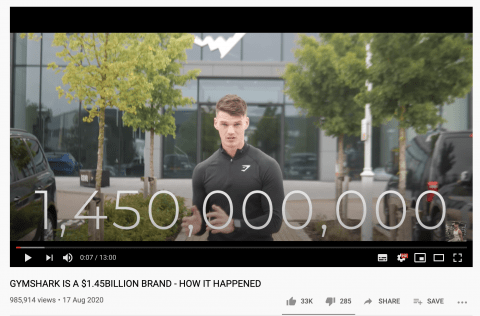
Final thoughts
Due to the rise in the influence of digital media and marketing, personal branding has become an essential business tool, not just an optional take up.
No matter how digital assets evolve in the future, people will always buy into people. The consumer still wants to feel part of a brand. Customers want to know their opinions matter. We all want to connect with the people behind the brand, not just a company logo.
We will leave the last word with Louise Vaughan to summarise: “The creation of a strong personal brand is not about ego – it’s commercially critical in a post-COVID world. A strong personal brand for a business leader helps to attract and retain talent, establishes and drives business purpose, creates authenticity, promotes consumer trust, and is a key influencer in investor confidence.
“Not only that, but it can also create market differentiation, credibility, and reinforce the strength of market position and commercial ambition. Just ask Richard Branson.”
Want to know how Hallam can help support your personal brand goals? Get in touch with our experienced Digital PR team, who will be able to assist you in putting a strategy together that will put people at the heart of your business to help it thrive in this digital-first world.



